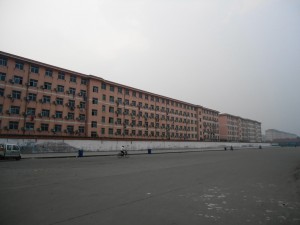Once regarded as a status job, factory work has lost its appeal to China’s young, notes ANDREW KIPNIS.
In China, factory work used to be an honourable profession. The vast majority of the people lived in villages and farmed. The factories were state-owned and located in the biggest cities; they provided better living conditions than the rural areas.
For a farmer, getting a job at a factory was a major step up the social ladder. Those who entered textile factories in the late 1970s and early 1980s described to me how proud they were of their occupations. ‘When I started work, we wore our uniforms like badges of honour,’ said a woman who retired in 2010 after a 30-year career. As China’s economy evolved during the 1980s, 1990s and 2000s, factory work lost its lustre. First, many rural communities began opening their own factories. Then more and more state-run factories went bankrupt or were privatised.
The largest cities began purposefully deindustrialising, building their service sectors at the expense of manufacturing. Newer factories opened in industrial parks on the outskirts of smaller cities or in newly built urban areas. Their workers were usually migrants from the countryside, often from half way across the country. Conditions became harsher and pay, though steady or rising in an absolute sense, declined relative to wages in white-collar sectors. For many, rather than being a step up from being a ‘peasant’, working in a factory indicated that one was a ‘peasant’—that is, someone who is officially registered as being from a rural village.

The decline in the status of being a factory worker has been a gradual process rather a sudden change. When I lived as a researcher in a rural village during the late 1980s, there were two small factories: a corn starch factory and a textile mill. Conditions at the corn starch factory were particularly poor. The stench, the flies, the steaming boilers and the constant leaks of vile-looking fluids made me think that the work there was both unsafe and unpleasant. Still, village youth fought over rights to work there. They considered employment in the factory much more modern and desirable than working in the sunshine and open spaces of the agricultural fields.
When I did research in a newly established industrial zone in the 2000s, less than 20 kilometres from the village I researched in the 1980s, I focused on a conglomerate that had become one of the largest textile manufacturers in the country. In the style of the old state-owned enterprises, the conglomerate had built apartments, schools, and day care centres for its permanent workers. But work conditions at the factory were hard: the temperature was kept high to protect the machinery, the noise was deafening and the work rate fast.
[ratina][/ratina]Many workers alternated among day, evening and night-time shifts, severely disrupting their sleep cycles. Still, the permanent, long-term workers I interviewed there were satisfied. Salaries, while average in comparison to national standards, were good in relation to the local cost of living. The housing and other benefits allowed the workers to live at an economic level that would have been unimaginable a decade earlier. Most of these workers planned on working for the company until their retirement and some even depicted the company as a saviour. When I asked about the heat, the noise, the work rate or the difficulties of shift work, they would reply, ‘We’re used to it.’
[ratina][/ratina]I also interviewed many youth working in nearby restaurants, shops and hotels, but they told a different story. The service work paid between half and two-thirds the wages of a starting factory job, but these young people still preferred it. Many had worked for a few months in the factories before quitting. They found factory work too stressful, too boring, and too tiring. ‘The managers just want to turn you into a robot,’ one complained.
Even those who worked at the factories told me that they only did it because of the desperate financial situations of their families. ‘I do it, but I’ll never get used to it,’ said a 23-year-old woman who had worked in textiles since she was 16.
Schools, perhaps, have something to do with youth aversion to factory work. In China’s notoriously competitive educational system, teachers and parents constantly look for ways to motivate their students to study harder. ‘Study hard, or you’ll spend the rest of your life as a factory worker,’ was a line I heard more than once.
Is factory work inherently alienating and unpleasant or is it a matter of the social prestige granted to factory workers? I pondered this question after giving a short talk at a career day at my son’s (Australian) high school. A student had asked me, ‘So basically, what you do all day is read books and write papers—isn’t that like a never-ending homework assignment?’
‘Maybe,’ I replied, ‘but I’m used to it.’
Main photo:
Industrial zone in a Chinese city. (Andrew Kipnis).
